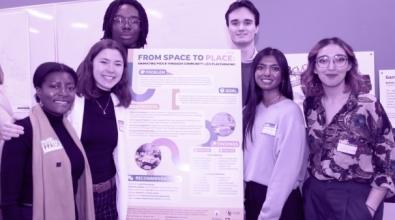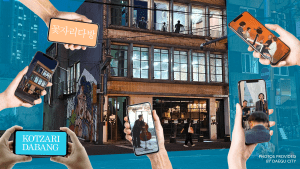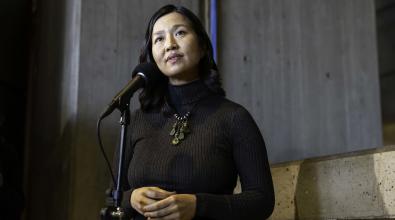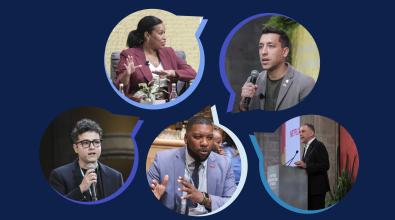 Read More
Read More
This city is putting its people in charge of public space

Listen to This Article
People everywhere have made seismic shifts in the ways they live, work, and play in cities over the past few years. And city leaders have responded in kind, taking unprecedented measures to answer what has become a universal question: What role do public spaces play in people’s lives today?
One of the most notable experiments on this front is taking place in Daegu, South Korea, where city leaders are enabling residents to answer that question for themselves. They’re doing so by piloting an Airbnb-like platform, called “Re:Permissioning the City,” that is designed to sidestep bureaucratic red tape and to put decisions around public space—whether it’s opening a pop-up restaurant or advertising on resident-run billboards—in the people’s hands.
While still in early stages, the Daegu effort is already uncovering insights that other local leaders might find helpful as they look to answer similar questions in their own cities.
Citizen-led governance can overhaul how public space is used, managed, and shared.
The way cities tend to grant permission to residents, organizations, or businesses to use space can involve a lengthy and even intimidating process of approvals and regulations. Whether it’s a community board or a city-wide parks department, these processes were generally created well before cities became the increasingly complex and dynamic places they are today. Re:Permissioning the City, for which Daegu was named one of the "Champion Cities" in the 2021 Bloomberg Philanthropies Global Mayors Challenge, is working to bridge that gap.
“It's very hard to manage the top-down model of governance,” explains Eunji Kang, the systems change and experimental products lead at Dark Matter Labs, a civic-focused nonprofit that is partnering with Daegu in this work. “In order to respond to that complexity, cities need to try a new way of doing things.”
In short, the new approach being rolled out in Daegu will use a digital system to allow residents to directly request public space for various activities, choosing from a sort of menu of options in various spaces intended for different purposes. A ratings and voting system will help the larger community shape the project. City leaders will not generally need to participate in determining each use by businesses or residents. Instead, digital architecture curated by residents—with supervision by city leaders—will independently do the heavy lifting. Daegu officials have designated two buildings with a legacy as cultural centers where they plan to begin testing this new approach this year.
There are a lot of ways cities can put this model of citizen-led governance to work.
One practical way for leaders to envision citizen-run spaces is to think of them as analogous to a land registry or Airbnb listings. Except here, the focus is on public spaces—not private homes—and making them as widely available as possible, rather than offering them to the highest bidder. And instead of the city determining how spaces are used, citizens do.
As Kang put it: “What if the space has a decision-making standard based on the public good rather than revenue outcomes?” Recycling hubs where community members can repair and refashion goods with expert help. A designated space where, on a certain day of the year, anybody can open an eatery. Kang says these are just a couple of many options for which this new system could be the key point of entry.
But the potential uses aren’t limited to spaces for artists to congregate or merchants to offer wares or young people to recreate. A more sophisticated system for designating who gets to use which public spaces—and when—could help unhoused populations and migrant communities achieve access to civic goods. According to Kang, the team has discussed using a system like this to address the refugee crisis with European cities, with the idea being to provide temporary homes while considering how to organize social services effectively.
This approach requires caution and rigorous protocols.
Some city leaders might be intrigued by the idea of self-governed, demand-driven spaces enabled by flexible planning regulations, and yet worry that it’s an approach that is out of reach or that could invite chaos. But there are safeguards and protections that can help stand something like this up, making it practical for communities. One part of how the Dark Matter Labs team sees this playing out is verification models that check identities of people asking to use spaces, and on-site sensors that keep tabs on activity. These help bring order to the registry system.
There’s also a compelling case—and pathway—for citizen-run spaces to fit into whole-city priorities like climate. Imposing expectations on citizen-run spaces to operate with net-zero (or at least limited) emissions, for instance, is very much on the table in Daegu, even if the city is still working out the details. And perhaps most compelling to city leaders averse to imposing new penalties or mandates, some of the regulatory work here can be managed through social norms and residents’ expectations of each other.
“When you use these sort of advanced-market frameworks, they tend to be regulatorily naturally cleaner, because they are people who are genuinely in love with a space, so there's a kind of positive bias towards that,” says Indy Johar, executive director at Dark Matter Labs.
Data can take this approach to the next level.
Any new effort like Daegu’s depends on data. The Dark Matter team envisions that cities following their lead will be collecting data on everything from air quality to energy consumption at these spaces. These kinds of data can be used by city leaders to get a sense of the project’s unintended effects on the community, while also considering the positive benefits by looking at either traditional city-wide indicators like crime or even a loneliness index.
Take energy use and emissions, for example. “We can use the data to understand how people actually engage with the urban space, and also [have] that data feed back to the city—and the city can actually reinforce a new way of… managing the space in relation to [a] climate outcome,” Kang says.
Daegu is still working out the details, including on thorny matters like conflict resolution when spaces are contested. But radical new approaches to public space are coming—and city leaders can benefit by thinking about and tracking what’s playing out in South Korea.
“There's layers of possibility that—once you start to build this capability—open up, one after another, which I think is the end goal of this framework,” Johar says.
Learn more about Dark Matter Labs’ work in Daegu here.

